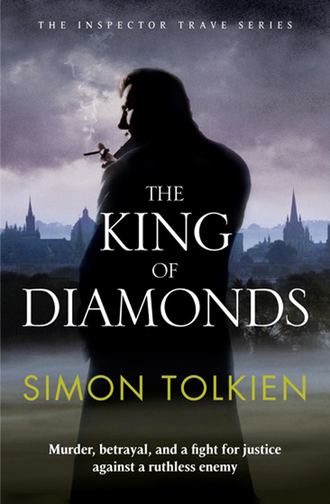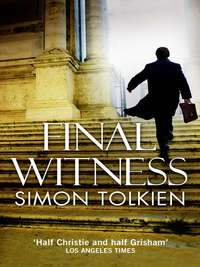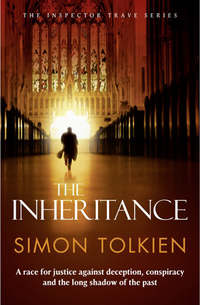
Полная версия
The King of Diamonds
‘Why?’
‘Because years ago I was able to help him when he needed help, because once upon a time I was married to his sister, because . . .’
Titus broke off in midsentence as if turning away from an unwanted memory. Vanessa couldn’t remember how she had first heard that Titus was a widower, but she’d known it for as long as she’d known him. And yet his dead wife had always been an invisible presence. There were no family photographs in the house that she’d ever seen and he’d never mentioned her until now.
‘What was her name?’ Vanessa asked. Her voice was quiet, almost a whisper, and she felt for a moment like a child pushing open a forbidden door.
‘Amélie.’
‘Was she beautiful?’
‘Yes.’
‘Do you miss her?’
‘Sometimes. My child too. But it is painful and so I try not to think about them.’
‘Your child! I never knew you had a child.’ Vanessa was rigid with astonishment.
‘Yes, a son like you, but younger. It is part of what draws me to you, I think, Vanessa. That we have both suffered, both lost what was dear to us. Life is never the same after that.’
‘But why didn’t you tell me before? When I told you about Joe?’
‘Because that conversation was about you, not me. I wanted to know how you felt, not to tell you about me.’
Vanessa sat back in the sofa, trying to cope with the confusion of her emotions. It made no sense that Titus should not have told her about his loss when she told him about hers, and yet it also made perfect sense because of the person he was. She vividly remembered the evening sitting up late in front of the fire in her flat when she’d described the terrible night of the motorcycle accident to Titus and told him in broken words about the shroud of meaninglessness that had hung over her ever since. She remembered the way he’d listened to her so quietly, so intently, so that she felt able to talk about what had happened, about what it meant, for really the first time since the accident. And she realized now that she couldn’t have talked like that, couldn’t have unburdened her soul, if the conversation had been about him as well as her. She felt a sudden wave of emotion, of gratitude toward this man about whom she still knew so little.
‘What happened to them? Your wife and child?’ she asked, leaning toward Titus with sympathy and concern written all over her face.
‘They died in the war. Back at the beginning when the Germans came in. Nothing special about it. There was a lot of bombing and many people lost their families back then. You go out, you go to work, you come back, and what do you find? Rubble. Yes, you English have the right word for it. Le mot juste. In the morning a house, a home; in the evening rubble.’
Titus had closed his fist while he was speaking, and now he suddenly opened it empty, like a circus conjuror. And with a bitter, twisted smile he got up and went over and stood by the window, looking out. It was almost dusk and hard to see past the lawn and the rose beds to the lake and the line of trees beyond.
‘Tramonte the Italians call it,’ he said musingly.
‘What?’
‘The twilight, the in-between time. It means “across the mountains” in English. And I suppose you could say that that’s where I’ve come from, Vanessa. Across the mountains. Bringing what I could out of the flames. Katya, my niece, more damaged than I am, whom I must try to protect however much she hates me for it, and Franz and Jana. Yes, Franz, Vanessa,’ said Titus, looking at her apologetically. ‘He is my family too, and I cannot turn my back on him even if I wanted to.’
‘But I wasn’t asking you to do anything like that,’ said Vanessa, raising her hands in protest. ‘Your life is your own; it’s not for me to interfere.’
‘But that’s where you’re wrong, my dear,’ said Titus, coming back over to the sofa and raising her right hand to his lips. ‘I want you to interfere; I want you to be a part of my life. Not just now but for always.’
Vanessa looked into Titus’s bright blue eyes and knew exactly what he was saying. She felt like a swimmer being borne out to sea on a riptide. She was falling in love with a man whom she hardly knew. Whom she hardly knew – an inner voice repeated the words inside her head, holding her back almost against her will.
‘I’m married, Titus,’ she said in a soft voice.
‘Yes, and your husband hates me,’ said Titus with a sigh.
‘No, he doesn’t. He just hates what you represent. Bill’s always been a fair man. It’s one of the things he prides himself on.’
‘Well, then maybe he’ll be fair to us and give you a divorce. Won’t you ask him, Vanessa?’
‘I don’t know,’ said Vanessa, sounding upset. It distressed her to hear Titus talking about Bill. Because she’d spoken no less than the truth. She did believe her husband was a fair man. He might be unable to express his emotions or to cope with his son’s death; he was certainly unbearable to live with; and yet he was fundamentally decent – good even. It wasn’t that she wanted to go back to him. She was sure of that, but she and Bill had been through a lot together; they’d been happy once, and something inside Vanessa rebelled at the thought of the divorce court, of a legal end to everything that had gone before.
And yet here was Titus offering her a new life, entirely unlike the one she’d left behind. He would take care of her; love her; encourage her to express herself in a way in which her husband had never been able to do. He was wealthy, influential, a man of the world. There would be no more scrimping and saving at the supermarket, no more worrying about the next bank statement. Surely her marriage was over? It was eighteen months since she’d left her husband. Did her independence, her tiny little flat, mean so much to her that she’d turn down the chance of becoming Mrs Osman? Or was it simply that she no longer believed in happiness, didn’t want to put the possibility of it to the test?
‘I don’t know,’ she said softly. ‘I don’t know, Titus. You must give me more time.’
‘Of course,’ he said. ‘All the time that you need, dearest Vanessa. It’s enough for me that you will think about it. Love will take care of the rest.’
Titus got to his feet with a smile. He was not discouraged. He’d watched the storm of conflicting emotions pass across Vanessa’s face, and he sensed how close he was to obtaining his heart’s desire.
CHAPTER 5
‘Why do you want a gun?’ asked Eddie as they completed another circuit of the exercise yard. Several hours had gone by since they had reached their agreement to escape, but they were both still in a state of unnatural excitement.
‘Because that bastard Claes had one,’ said David. ‘On the night I didn’t kill Ethan Mendel. You remember.’
‘So you’re going back there?’
‘Yeah, but not for long. You don’t have to take me if you don’t want to.’
‘No, I’ll take you. It’s on the way out of Oxford. But what you do in there’s your business.’
‘Fine.’
Here, in the exercise yard, they were in the very centre of the prison and the high walls of the wing buildings surrounding them formed a barrier against the wind that was blowing hard across the city outside, but they still wore the collars of their jackets turned up high against the unseasonable cold, leaning their heads close together when they spoke to hear what the other was saying. Halfway round each circuit, David glanced up at the top of the rec room block on the other side of the yard. It seemed impossibly high to come down from, but at least the roof was reasonably flat so there was less risk of slipping down the tiles on the other side and breaking one’s neck on the ground below.
And Eddie had been right about the scaffolding. A gang of workmen had just been finishing carrying the poles in through the door to the gymnasium on the ground floor when they’d come out for afternoon exercise, and now David could see their heads moving across the barred rec room windows up at the top of the building as they assembled the scaffold.
‘How are we going to get in there? The rec room’s going to be out of bounds while they’re painting it,’ he asked, leaning toward Eddie again and pointing across the yard.
‘Yeah, but not the gym,’ said Eddie. ‘They’re painting the rec room first and then the gym. That’s what I heard and it makes sense if you think about it. One’s on top of the other, and they don’t want both out of use at the same time; otherwise, what are they going to do with us? So all we’ve got to do is slip up the stairs from the gym during evening association and then wait until everyone’s back in their cells.’
‘Except us! How the hell are we going to get past the head count?’ asked David, suddenly raising his voice so that several prisoners nearby turned and looked over at them with curiosity. He couldn’t believe that he hadn’t thought of this before. The screws went round the cells, landing by landing, every evening before lights-out counting the prisoners, making sure they were all there. Except that he and Eddie wouldn’t be; they’d be hiding under a dust sheet over in the rec room, waiting to be caught. Like sitting ducks.
‘Keep your fucking voice down, can’t you?’ said Eddie angrily, pulling David over toward a set of steps leading up to B Wing, where they sat down. ‘People have ears, you know. Of course I’ve thought about the count. Do you think I’m an idiot? We’ll make dummies and put them in our beds, and then we’ll go at the weekend when they’re understaffed. Association’s later on Fridays and Saturdays and they do a lot less checking.’
‘Yeah, but what happens if they talk to us, ask us something?’ asked David, refusing to be reassured.
‘Well, we’ll be asleep with the lights out and we’ll just have to hope they don’t. Like I told you before, you need some luck to succeed with something like this.’
David sighed, thinking about the succession of events that had brought him to where he was now. If there was one thing he wasn’t, it was lucky.
Uncharacteristically, Eddie went to sleep early that night, but David tossed and turned in his bunk, thinking of Katya. Now that he had allowed himself to start thinking of escaping his prison walls, David’s obsession with the girl who had betrayed him had returned in full force. Once again the vision of her locked in naked embrace with that Belgian bastard returned to haunt him. The thin, hawkeyed prosecutor at his trial hadn’t known that he’d looked in at them through the grimy boathouse window; he’d only guessed. But it had been a bull’s-eye guess. David had lied at his trial – said he’d never seen them together. How could he have done otherwise? But he couldn’t hide behind the lie now. The memory of that spring afternoon returned in Technicolor to haunt him, and he saw them again, coupling like a pair of beasts on the ground. Two or three seconds he’d looked. No more than that, but it was enough for the memory to last a lifetime.
David remembered how he’d fallen back from the windowsill and run blindly down to the lakeside, fallen on his knees, and vomited his lunch down into the grey water. There they were behind him in the boathouse intertwined, interlocked. In the same place where Katya had met with him the year before. But they hadn’t writhed on the floor like animals. Kissing, holding hands, but nothing like that. It wasn’t an act of love; it was an act of hate. That’s what it was. A way of saying he didn’t exist. And it was the same hate she’d shown him in the courtroom when she’d read out his letters with such contempt, when she smiled at him after he got his sentence and was led off to the cells like a dog. He hated her himself now; with every fibre of his being he hated her, just as much as he’d loved her before. She’d trampled on him, robbed him of everything he had, and now she was going to have to look him in the face and tell him why. Suddenly still, David closed his eyes tight shut, clenching his body in anticipation of that moment.
Two nights later, working by torchlight in the darkness, they started work on the dummy heads. Eddie had been busy in the interim purloining what he needed, and, not for the first time, David was impressed by his cellmate’s resourcefulness. He had got carrots and flour from the kitchens and a spare prison-issue blue-and-white shirt from the laundry, which he had torn into small pieces.
‘That’s for the inside of the heads when I’ve got the outsides ready,’ said Eddie, who was standing over the sink in the corner mixing his ingredients. Page by page, he was tearing up O’Brien’s Jesus for Prisoners and adding it with practised hands to the flour and water mush to make papier-mâché.
‘What are the carrots for then?’ asked David curiously.
‘To give the heads some flesh colour.’
‘What about hair?’
‘Paintbrushes! I got two out of the rec room last night. The workmen leave them behind when they go home,’ said Eddie, looking even more pleased with himself than usual as he pulled back his mattress to reveal his ill-gotten gains. ‘You can start pulling the bristles out while I’m doing this.’
‘How was it over there?’ David asked. They’d been working steadily for a little while and David had now finished with the first paintbrush and started work on the second.
‘Great,’ said Eddie, breaking off from humming a discordant version of Elvis Presley’s ‘Love Me Tender’ as he looked up from the sink. ‘They’ve got all the dust sheets we need in there, which helps because we can’t use the sheets in here – we’ll need them for covering the dummies. The scaffolding’s up near the ceiling, just where we want it, and there’s an old half-broken tubular chair in a corner that’ll work perfectly for a grapple. You know, to get over that first wall. It’s looking good, Davy, really good.’
An hour later Eddie was ready with the first head. He’d sculpted out a crude nose and ears and now he used a tube of glue that he’d stolen from God knows where to add bristles from David’s pile to make hair and eyebrows.
‘It’ll do,’ he said, turning the head from side to side. ‘We can use a pen to touch them up at the end after they’ve dried.’
‘How long’ll that take?’
‘Twenty-four, thirty-six hours maybe. Don’t worry. We’ve got time. It’s the screws finding them that bothers me. We’ll have to keep them under the bunks and hope there isn’t a cell search. That’s all.’
‘Hope we’re lucky, you mean?’
‘Yeah, and stop sounding like a doubting Thomas all the time, okay? It’s getting on my nerves.’
It was unlike Eddie to sound so irritated for no reason. The tension must be getting to him too, David realized.
They went as planned on the Saturday night. When the cell doors were opened for evening association, Eddie had the dummies ready in the bunks. They’d broken up their two wooden chairs and covered them with their jackets and bunched up bedclothes to simulate their bodies, and then they’d laid the papier-mâché heads in profile on the pillows. The effect was better than David had anticipated, but Eddie, eyeing his handiwork with a professional detachment, was less confident.
‘They’ll work okay if the screws are just doing a quick check through the Judas hole, but if they come in here, we’ve had it,’ he said, giving the dummies a final dissatisfied look before they left the cell for what they hoped would be the last time. David’s heart was beating so fast he felt it would burst.
Eddie had been right: There were less screws on duty than usual – just one out in the yard and another at a desk in the corner reading a newspaper, nowhere near the doorway at the other end of the gym that opened onto the darkened stairs leading up to the rec room above. And there’d been no head count going in, which made it a lot less likely there’d be one going out. But these positive developments didn’t help David calm down, and he soon began to find the waiting almost unbearable. Eddie had been adamant that they should stay downstairs until almost the last minute since there would be far less chance of their being missed that way, and he seemed to have no problem passing the time chatting to the other prisoners and joining in a game of basketball down the other end of the gym, but David couldn’t take his eyes off the clock on the wall. Time seemed to have stopped; the minute hand didn’t move at all, and he kept looking toward the stairs and then over at Eddie, waiting for him to give the signal for them to go.
At quarter past seven, fifteen minutes before the end of association, Eddie came over. He looked furious.
‘What the hell are you doing, Davy?’ he asked in an angry whisper. ‘Hopping from one leg to the other gazing up at the bloody clock – you might as well go and tell that screw over there exactly what we’re planning. Do something for Christ’s sake. Anything. Just stop looking shifty.’
Eddie moved away before David could answer, and for the next ten minutes David walked the perimeter of the gym, keeping his head down, only glancing up occasionally at Eddie, never at the stairs. Until, at twenty-five past seven, he felt a tap on his shoulder and, seconds later, saw Eddie slip through the doorway and up the stairs. No one seemed to have noticed, and a minute or two later, he followed.
Eddie was at the top of the stairs holding a small half-sized gym mat folded up in his hand.
‘What do you want that for?’ David asked.
‘You’ll see.’
The door to the rec room was locked, but Eddie seemed to have expected that. He took a thin piece of wire from out of his pocket, fiddled inside the keyhole for a moment, and then opened the door with a gentle push.
‘Piece of cake,’ he whispered before beckoning David to follow him inside. The rec room looked very different from when David had last seen it. Dust sheets covered the furniture, the pool and the ping-pong tables, and a scaffold on wheels stood in the corner, leaning up against the far wall. There were no ladders. The workmen must have taken them with them when they left for the day. Outside the windows the sun had almost set over the exercise yard, leaving the big room in an eerie twilight.
Through the open door they heard the guard’s whistle down below, signalling the end of association, and then came the sound of the prisoners spilling out into the exercise yard and crossing over to A Wing, until finally the door of the gym shut with a bang, a guard’s voice shouted ‘goodnight’, and they were left alone in sudden silence.
‘All right. Let’s get to work,’ said Eddie, crossing over to the scaffold with a determined look on his face. ‘Come on; give us a hand, Davy. We need to move this. We don’t want to be visible through the windows, do we?’
Gently, they trundled the scaffold over to the centre of the wall and then, once Eddie was satisfied with its position, he started clambering up its side toward the top. Halfway up he stopped, bent down, picked something up from one of the planks, and then let out a suppressed whoop of delight. He had something metal in his hand, but in the half-light David couldn’t make out what it was.
‘We’re in luck,’ said Eddie, waving the thing in the air like it was some kind of trophy, his face creased with a wide smile.
‘What is it?’ asked David from below, irritated by his own incomprehension.
‘A scaffolding clip, you idiot. They must have had one over that they didn’t use.’
‘How does it help us?’
‘For making a hole so we can get up through there,’ said Eddie, pointing at the ceiling. ‘It’s going to have a bit more weight behind it than our paint brush handles, isn’t it?’
David nodded. He resented being spoken to like he was some bottom-of-the-class schoolboy, but he could see the point. The clip would help; it was a good omen.
Once he was up on the top of the scaffold, Eddie beckoned down to David to follow. It was a high room and the ceiling suddenly seemed impossibly far away, and David cursed the workmen under his breath for taking away their ladders. It didn’t take him long to realize that he was a far less skilful climber than his cellmate. He lacked the strength in his upper arms to haul himself up between the bars and he found it hard to balance on the narrow footholds. Two-thirds of the way up, he got stranded, unable to go up or down, and Eddie had to come down and help him the rest of the way.
‘Now maybe you can see the point of why I work out in the gym every day,’ said Eddie with a self-satisfied smile as he pulled and lifted David up onto the top level. He seemed to have forgotten his earlier ill humour now that he’d found the clip and they were under way with the escape.
‘What about keeping a lookout?’ asked David.
‘No point. If anyone comes up here, we’ve had it anyway. Unless you can think of an explanation of why we’re making a bloody great hole in the rec room ceiling after lights-out, of course,’ Eddie added with a grin.
Now, lifting the clip above his head, Eddie punched it up into the ceiling, and David joined in beside him using the wooden paint brush handle that he’d brought from the cell. Almost immediately a great cloud of white plaster mixed up with horsehair fell on their heads, half-blinding them. Wiping the dust from their eyes, they looked at each other and burst out laughing.
A pair of snowmen up to no good, that’s what we are, thought David. The adrenaline coursed through his veins and he suddenly felt absurdly happy.
Bit by bit the plaster came away, and soon the hole above their heads was large enough for them to see through to the roof space above.
‘I’m going up to take a look,’ said Eddie. ‘I won’t be long.’
Standing on David’s hands, he hauled himself up through the opening onto the rafters above, and for a moment all David could see from below was the beam of Eddie’s pocket torch travelling across the timber underside of the roof. It seemed a long way away.
But Eddie had lost none of his confidence when he came back down.
‘It’ll work,’ he said. ‘There are a couple of planks across the beams where we can stand. We’re lucky it’s a flat roof. It’s going to make it a lot easier. You finish off the hole. I’m going down to get the dust sheets and the chair.’
‘What chair?’
‘The one over there in the corner. The one for the grapple, remember?’ said Eddie, pointing down to a cheap swivel chair behind the door. It was missing one of its wheels, and David was surprised it hadn’t been thrown away.
Clambering up and down the scaffold like a human monkey, Eddie brought the gym mat and four of the dust sheets up from below, and then tied a last one around the base of the chair and pulled it up to the top, where he positioned it under the hole in the ceiling that David had just finished widening.
‘Right, you first. I’ll hand you the stuff once you’re up there,’ said Eddie, holding the chair steady as David got on it and put his head up into the dark roof space above, feeling with his hands for the rafters on either side so he could lever himself up. But then he froze. Down below, someone, it had to be a screw, was rattling the handle of the gymnasium door.
For what seemed an eternity but was in fact less than a minute, David stood motionless on the swivel chair, his feet and legs in the rec room, his head and upper body in the roof space above.
What an idiot, he thought to himself. What an idiot I was to think we could get away with something as harebrained as this. He’d not yet done any time in the punishment block, but he’d heard enough about it to feel sick to his stomach at the prospect.
But then Eddie’s voice came from below his feet.
‘It’s all right, he’s gone. Just some screw doing his rounds, checking the doors are locked. That’s all.’
Relief flooded through David, leaving him weak at the knees, and he had to use all his strength to haul himself up through the hole. But there was no time to relax as Eddie started handing him up the mat and the dust sheets straightaway before following himself, pulling the swivel chair up after him by the dust-sheet rope to which it remained attached.
‘I thought we’d had it,’ said David, wiping the sweat from his brow. His hands were shaking uncontrollably.
‘Yeah, well, you were wrong. You need to calm down, keep your nerve. That’s what you need to do. Because up there we’re going to have to be even more careful,’ said Eddie, shining his torch over the underside of the roof above their heads. ‘We can’t risk even one of those slates falling off. You hear me?’







